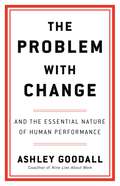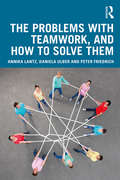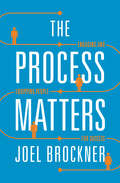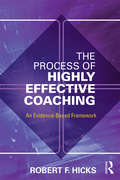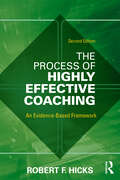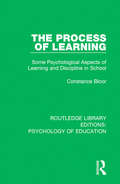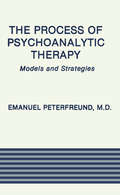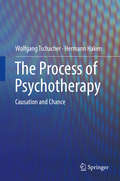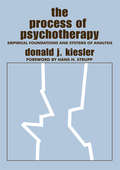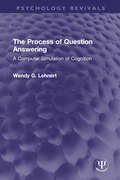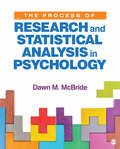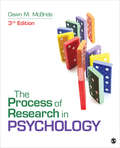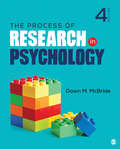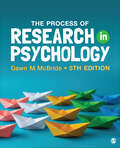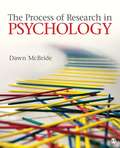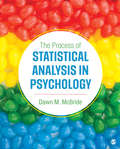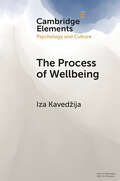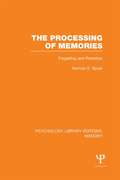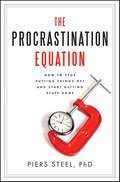- Table View
- List View
The Problem with Change: And the Essential Nature of Human Performance
by Ashley GoodallIf you&’ve had enough of the constant turbulence that defines corporate life today, you&’re not alone. Learn why change is bad for people and for business, and discover how to create the stability that we all need to thrive. For decades, &“disruption&” and &“change&” have been seen as essential to business growth and success. In this provocative and incisive book, leadership expert Ashley Goodall argues that what has become a sacred dogma is both wrong and harmful. Whether it&’s a merger or re-org or a new office layout, change has become the ultimate easy button for leaders, who pursue it with abandon, unleashing a torrent of disruption on employees. The result is what Goodall calls &“life in the blender&”—a perpetual cycle of upheaval, uncertainty, and unease. The problem with change, Goodall argues, is that a culture where everything from people to processes to strategic priorities are constantly in flux exerts a psychological toll that undermines motivation, productivity, and performance. And yet so accustomed are we to constant churn that we have become numb to its very real consequences. Drawing on two decades spent leading HR organizations at Deloitte and Cisco, Ashley Goodall reveals why change is not the same as improvement, and how, by prioritizing team cohesion (instead of reshuffling teams at will), by using real words (rather than corporate-speak), by sharing secrets (not mission statements), by fixing only the things that are truly broken (instead of moving fast and breaking everything in sight, and more, leaders at every level can create the stability that people need to thrive.
The Problems with Teamwork, and How to Solve Them
by Annika Lantz Friedrich Daniela Ulber Peter FriedrichThis book offers practical, evidence-based solutions to help professionals implement and support effective teamwork. Lantz, Ulber and Friedrich draw on their considerable professional experience to present common problems in team-based organizations, what empirical research tells us the causes are and which solutions are more effective in overcoming team-based obstacles. In The Problems with Teamwork, and How to Solve Them, nine common problems are identified, ranging from lack of leadership and adaptability to conflict and cohesiveness, accompanied by clear instructions on how to approach and resolve the individual issues. Detailed case studies are presented throughout the book, demonstrating how theory can be applied to real-life situations to produce optimal results for both the team and the larger organisation. By combining theory and practice, and using state-of-the-art research, the book constructs a cognitive map for identifying problem causes and effect, and step-by-step instructions on how to solve problems. This is essential reading for anyone working in team-based organizations, as well as students and academics in related areas such as organizational psychology and organizational behaviour.
The Process Matters
by Joel BrocknerWe do business in a results-oriented world. Our focus on growth is laudable for its clarity, but one of its downsides is that firms can lose sight of the process: how business gets done and the individuals or employees through whom results are achieved. This leads to compromised decisions and unethical behavior. It is not just what we accomplish that matters but also how we accomplish it. In The Process Matters, Joel Brockner shows that managers have to do more than just meet targets and goals. They have to reach those ends in the right ways--with input, consistency, and accountability--if they want to effectively lead and manage in their organizations. Brockner discusses what goes into the right process, how it leads to better outcomes, why it is easier said than done, and how to overcome obstacles along the way. Brockner demonstrates that a high-quality process often costs little and may not even require a great deal of time. In light of these facts, he considers the puzzling question of why good business practice doesn't happen more often. Brockner draws from various real-life workplace examples--from Jay Leno's departure (twice) from his TV show, to the improvement of shooting accuracy in the U.S. Navy, to the surprising results of layoffs in Canada. He also factors in a wide swath of studies to examine such issues as the importance of perceived fairness in the process, the management of organizational change, and the encouragement of a strong sense of self in those involved in decisions--in short, the ways that managers can bring out the best in their people. Relevant to anyone who is in a managerial position--from the CEO on down--The Process Matters proves that seemingly simple differences in process can go a long way.
The Process of Highly Effective Coaching: An Evidence-Based Framework
by Robert F. HicksThe Process of Highly Effective Coaching offers a unique blend of theory and practical methods for conducting effective coaching conversations. It provides an umbrella under which all of the major conceptual models for helping people change can not only coexist but work together. In addition to using this integrative approach, The Process of Highly Effective Coaching presents a framework for conducting coaching conversations and for relating the coaching process to the coaching competencies defined by the International Coach Federation, the largest coach-credentialing organization in the world.
The Process of Highly Effective Coaching: An Evidence-Based Framework
by Robert F. HicksThe Process of Highly Effective Coaching, 2nd edition, offers a unique blend of theory and practical methods for conducting effective coaching conversations. The book presents a framework for navigating a conversation’s dynamic flow, enabling the practitioner to assimilate information and exhibit the agility of master-level coaches. Additionally, the framework synergistically incorporates the major evidence-based models for achieving client-driven outcomes. This second edition contains fresh content that ties the Foursquare Coaching Framework to the latest information from neuropsychology, leadership, and organizational change.
The Process of Learning: Some Psychological Aspects of Learning and Discipline in School (Routledge Library Editions: Psychology of Education)
by Constance BloorOriginally published in 1930, this book was designed to meet the needs of students in Training Colleges. It is the outcome of first-hand experience of the difficulties encountered by students in the subject of educational theory and its application to the problems of the classroom at the time. It was the hope of the writer that this book may help the student to find a profitable connection between the theory of the lecture room and the problems of the school classroom.
The Process of Psychoanalytic Therapy: Models and Strategies
by Emanuel PeterfreundIn his extensive description of the heuristic approach to psychoanalytic therapy, Peterfreund discusses the strategies used by both patient and therapist as they move toward discovery and deeper understanding.
The Process of Psychotherapy: Causation and Chance
by Hermann Haken Wolfgang TschacherThis book describes an encompassing modeling approach to psychotherapy, created with the most recent research in the field. Therapeutic interventions are staged within a therapist-client relationship ('alliance'), and become effective by the interplay of deterministic ('causation') and stochastic ('chance') forces. The authors use a Fokker-Planck approach complemented by a structural-mathematical framework from complexity theory. Chapters present statistical tools, which can be applied to analyze the differing time series that depict therapeutic processes. Chapters include examples of how to use these tools within research. The approach adopted in the book – contemporary psychotherapy terminology combined with a systems-theoretical model and algorithms for quantitative psychotherapy research – has the potential to become the new benchmark in psychotherapy. The Process of Psychotherapy is an informative and sophisticated resource for all levels of students, from undergraduate through post-doctoral studies, in the fields of psychology, cognitive psychology, and psychotherapy.
The Process of Psychotherapy: Empirical Foundations and Systems of Analysis
by Donald J. KieslerTo understand the process of psychotherapeutic change, one must look for the answers in the psychotherapeutic process itself. This process involves the exchange of communications between two (or more) participants, and as a result of the exchange, modifications in the personality and behavior of the patient are expected to occur. But what is the nature of the therapeutic messages? How do they produce changes in the patient? What aspects of the messages are important for therapeutic change? And if the therapeutic force is somehow encoded in the messages, where shall we look for it- in sentence structure, in emotional overtones, in gestures and body movements? The Process of Psychotherapy is divided into two major parts, dealing respectively with method and with systems. In Part I, the author presents an analysis of psychotherapy process research from a communications perspective, developing an incisive and detailed analysis of the methodological issues that confront researchers in this field and suggesting theoretical and empirical strategies for addressing these issues. Part II provides the first exhaustive and detailed summary of extant psychotherapy process systems. The author first deals with direct systems, those procedures of content analysis or rating scales that have been developed to assess the exchanges between therapists and patients. Seventeen major direct process systems are presented in detail and are summarized with ample citations to the literature. The final section of the book offers an exhaustive listing and concise description of various indirect measures of psychotherapy process, which do not assess the verbatim interview exchanges of the participants in therapy but rather assess the participants' perceptions via self-report or standard analogue procedures. This book is a basic, sophisticated, and exhaustive coverage of psychotherapy process and content analysis that will become the standard and authoritative source for anyone interested in the process of psychotherapy, whether as student, researcher, or practitioner.
The Process of Question Answering: A Computer Simulation of Cognition (Psychology Revivals)
by Wendy G. LehnertOriginally published in 1978, The Process of Question Answering examines a phenomenon that relies on many realms of human cognition: language comprehension, memory retrieval, and language generation. Problems in computational question answering assume a new perspective when question answering is viewed as a problem in natural language processing. A theory of human question answering must necessarily entail a theory of human memory organization and theories of the cognitive processes that access and manipulate information in memory. This book describes question answering as a particular task in information processing. The theoretical models described here have been built on a formulation of general theories in natural language processing: theories about language that were developed without the specific problem of question answering in mind. By requiring programmers to be concerned with the precise form of information in memory, and the precise operations manipulating that information, they can uncover significant problems that would otherwise be overlooked. An early insight into artificial intelligence, today this reissue can be enjoyed in its historical context.
The Process of Research and Statistical Analysis in Psychology
by Dawn M. McBrideThe Process of Research and Statistical Analysis in Psychology presents integrated coverage of psychological research methods and statistical analysis to illustrate how these two crucial processes work together to uncover new information. Best-selling author Dawn M. McBride draws on over 20 years of experience using a practical step-by-step approach in her teaching to guide readers through the full process of designing, conducting, and presenting a research study. The text opens with introductory discussions of why psychologists conduct and analyze research before digging into the process of designing an experiment and performing statistical analyses. Each chapter concludes with exercises and activities that promote critical thinking, the smart consumption of research, and practical application. Readers will come away with a complete picture of the role that research plays in psychology as well as their everyday lives.
The Process of Research and Statistical Analysis in Psychology
by Dawn M. McBrideThe Process of Research and Statistical Analysis in Psychology presents integrated coverage of psychological research methods and statistical analysis to illustrate how these two crucial processes work together to uncover new information. Best-selling author Dawn M. McBride draws on over 20 years of experience using a practical step-by-step approach in her teaching to guide readers through the full process of designing, conducting, and presenting a research study. The text opens with introductory discussions of why psychologists conduct and analyze research before digging into the process of designing an experiment and performing statistical analyses. Each chapter concludes with exercises and activities that promote critical thinking, the smart consumption of research, and practical application. Readers will come away with a complete picture of the role that research plays in psychology as well as their everyday lives.
The Process of Research in Psychology
by Dawn M. McBrideUsing diverse examples from published research, the Third Edition of The Process of Research in Psychology by Dawn M. McBride provides step-by-step coverage on how to design, conduct, and present a research study. Early chapters introduce important concepts for developing research ideas while subsequent "nuts and bolts" chapters provide more detailed coverage of topics and examine the types of research relevant to the field. This logical two-part structure creates an excellent foundation upon which students can build their knowledge of the entire research process.
The Process of Research in Psychology
by Dawn M. McBrideThe Process of Research in Psychology employs the pedagogical approach of spaced repetition to present a student-friendly introduction to conducting research in psychology. Drawing on more than 17 years of teaching experience, best-selling author Dawn M. McBride covers topics with step-by-step explanations to help students understand the full process of designing, conducting, and presenting a research study. Early chapters introduce important concepts for developing research ideas, subject sampling, ethics, and data collection; more detailed coverage of these topics is included in “More About” chapters to provide instructors with flexibility in their teaching. Concepts and skills relevant to more than one stage of the research process are covered in multiple contexts, providing repeated exposure to the topics students often struggle with but that are the most important in gaining research skills.
The Process of Research in Psychology
by Dawn M. McBrideThe Process of Research in Psychology employs the pedagogical approach of spaced repetition to present a student-friendly introduction to conducting research in psychology. Drawing on more than 17 years of teaching experience, best-selling author Dawn M. McBride covers topics with step-by-step explanations to help students understand the full process of designing, conducting, and presenting a research study. Early chapters introduce important concepts for developing research ideas, subject sampling, ethics, and data collection; more detailed coverage of these topics is included in “More About” chapters to provide instructors with flexibility in their teaching. Concepts and skills relevant to more than one stage of the research process are covered in multiple contexts, providing repeated exposure to the topics students often struggle with but that are the most important in gaining research skills.
The Process of Research in Psychology
by Dawn M. McBrideWith a structure focused on process over memorization, best-selling author Dawn M. McBride′s The Process of Research in Psychology, Fifth Edition covers topics with a step-by-step approach to help students understand the full progression of developing, conducting, and presenting a research study from start to finish. Early chapters introduce important concepts for developing research ideas, subject sampling, ethics, and data collection; more detailed coverage of these topics is included in the "More About" chapters to provide instructors with flexibility to focus on the methods students will use in their projects. Concepts and skills relevant to more than one stage of the research process are covered in multiple contexts to give students repeated opportunities to learn about the most important, and often most difficult, research concepts at the moment they’re used. This new Fifth Edition features added discussion on validity and reliability; a reorganized chapter on survey research to group topics more clearly and to provide more information on qualitative analysis; more questions in the "Test Yourself" quizzes at the end of each chapter to focus more on application; and additional references to the increasingly popular statistical software programs JASP and R. This title is accompanied by a complete teaching and learning package. Contact your Sage representative to request a demo. Learning Platform / Courseware Sage Vantage is an intuitive learning platform that integrates quality Sage textbook content with assignable multimedia activities and auto-graded assessments to drive student engagement and ensure accountability. Unparalleled in its ease of use and built for dynamic teaching and learning, Vantage offers customizable LMS integration and best-in-class support. It’s a learning platform you, and your students, will actually love. Learn more. Assignable Video with Assessment Assignable video (available in Sage Vantage) is tied to learning objectives and curated exclusively for this text to bring concepts to life. Watch a sample video now. LMS Cartridge: Import this title’s instructor resources into your school’s learning management system (LMS) and save time. Don’t use an LMS? You can still access all of the same online resources for this title via the password-protected Instructor Resource Site. Learn more.
The Process of Research in Psychology
by Dawn M. McBrideWith a structure focused on process over memorization, best-selling author Dawn M. McBride′s The Process of Research in Psychology, Fifth Edition covers topics with a step-by-step approach to help students understand the full progression of developing, conducting, and presenting a research study from start to finish. Early chapters introduce important concepts for developing research ideas, subject sampling, ethics, and data collection; more detailed coverage of these topics is included in the "More About" chapters to provide instructors with flexibility to focus on the methods students will use in their projects. Concepts and skills relevant to more than one stage of the research process are covered in multiple contexts to give students repeated opportunities to learn about the most important, and often most difficult, research concepts at the moment they’re used. This new Fifth Edition features added discussion on validity and reliability; a reorganized chapter on survey research to group topics more clearly and to provide more information on qualitative analysis; more questions in the "Test Yourself" quizzes at the end of each chapter to focus more on application; and additional references to the increasingly popular statistical software programs JASP and R. This title is accompanied by a complete teaching and learning package. Contact your Sage representative to request a demo. Learning Platform / Courseware Sage Vantage is an intuitive learning platform that integrates quality Sage textbook content with assignable multimedia activities and auto-graded assessments to drive student engagement and ensure accountability. Unparalleled in its ease of use and built for dynamic teaching and learning, Vantage offers customizable LMS integration and best-in-class support. It’s a learning platform you, and your students, will actually love. Learn more. Assignable Video with Assessment Assignable video (available in Sage Vantage) is tied to learning objectives and curated exclusively for this text to bring concepts to life. Watch a sample video now. LMS Cartridge: Import this title’s instructor resources into your school’s learning management system (LMS) and save time. Don’t use an LMS? You can still access all of the same online resources for this title via the password-protected Instructor Resource Site. Learn more.
The Process of Research in Psychology
by Dawn M. McbrideUsing diverse examples from published research, the Third Edition of The Process of Research in Psychology by Dawn M. McBride provides step-by-step coverage on how to design, conduct, and present a research study. Early chapters introduce important concepts for developing research ideas while subsequent "nuts and bolts" chapters provide more detailed coverage of topics and examine the types of research relevant to the field. This logical two-part structure creates an excellent foundation upon which students can build their knowledge of the entire research process.
The Process of Research in Psychology (1st edition)
by Dawn M. McbrideThe book offers a clear description of concepts and skills important for conducting psychological research with clear, simple examples to illustrate these concepts. Author Dawn McBride covers the material in a methods text, but organizes as chronological steps in designing, conducting, and presenting a psychology research study. The concepts are presented using the special pedagogical approach throughout the text to present students with various learning opportunities in multiple contexts.
The Process of Statistical Analysis in Psychology: Mcbride: The Process Of Statistical Analysis In Psychology (paperback) + Mcbride: The Process Of Statistical Analysis In Psychology (paperback)
by Dawn M. McBrideThis new introductory statistics text from Dawn M. McBride, best-selling author of The Process of Research in Psychology, covers the background and process of statistical analysis, along with how to use essential tools for working with data from the field. Research studies are included throughout from both the perspective of a student conducting their own research study and of someone encountering research in their daily life. McBride helps readers gain the knowledge they need to become better consumers of research and statistics used in everyday decision-making and connects the process of research design with the tools employed in statistical analysis. Instructors and students alike will appreciate the extra opportunities for practice with the accompanying Lab Manual for Statistical Analysis, also written by McBride and her frequent collaborator, J. Cooper Cutting.
The Process of Statistical Analysis in Psychology: The Process of Statistical Analysis in Psychology
by Dawn M. McBrideThis new introductory statistics text from Dawn M. McBride, best-selling author of The Process of Research in Psychology, covers the background and process of statistical analysis, along with how to use essential tools for working with data from the field. Research studies are included throughout from both the perspective of a student conducting their own research study and of someone encountering research in their daily life. McBride helps readers gain the knowledge they need to become better consumers of research and statistics used in everyday decision-making and connects the process of research design with the tools employed in statistical analysis. Instructors and students alike will appreciate the extra opportunities for practice with the accompanying Lab Manual for Statistical Analysis, also written by McBride and her frequent collaborator, J. Cooper Cutting.
The Process of Wellbeing: Conviviality, Care, Creativity (Elements in Psychology and Culture)
by Iza KavedžijaThe Process of Wellbeing develops an anthropological perspective on wellbeing as an intersubjective process that can be approached through the prism of three complementary conceptual framings: conviviality; care; and creativity. Drawing on ethnographic discussions of these themes in a range of cultural contexts around the world, it shows how anthropological research can help to enlarge and refine understandings of wellbeing, through dialogue with different perspectives and understandings of what it means to live well with others and the skills required to do so. Rather than a state or achievement, wellbeing comes into view here as an ongoing process that involves human and nonhuman others. It does not pertain to the individual alone, but plays out within the relations of care that constitute people, moving and thriving in circulation through affective environments.
The Processing of Information and Structure
by W. R. GarnerFirst published in 1974. Routledge is an imprint of Taylor & Francis, an informa company.
The Processing of Memories: Forgetting and Retention (Psychology Library Editions: Memory)
by Norman E. SpearOriginally published in 1978, this volume contains the evidence that is most crucial for our understanding the processes of forgetting and retention. Organized in terms of problem areas and issues that are particularly pertinent to understanding these processes, the book deals with both animal and human studies. The author begins by defining the topic and reviewing its historical development. A theoretical orientation follows, and then the author begins to address the major factors that determine what is, and what is not, remembered. Although we cannot yet specify the principles from which we can predict when an episode, once learned, will be remembered well or forgotten entirely, the author demonstrates that such principles are not that far away. He considers the issues that must be resolved before such principles are established, and in the course of doing so covers the major research on why we remember events and why they are forgotten.
The Procrastination Equation: How to Stop Putting Things Off and Start Getting Stuff Done
by Piers Steel“The Procrastination Equation will teach you how to bust the excuses that are preventing you from doing your best work and living your best life….So don’t put it off any longer. Read this book. Today.” —Daniel H. Pink, author of Drive and A Whole New Mind“Illuminating….Piers Steel shows us the secrets of procrastination, how it affects us and how we will, one day, be able to prevail.”—Dan Ariely, author of The Upside of Irrationality and Predictably Irrational Using a mix of psychology, evolutionary biology, self-help, and more than a decade of research, Dr. Piers Steel, the world’s foremost authority on procrastination, offers a tried and true method helping us to identify, understand, and break free of our self-destructive bad habits and create more positive lives for ourselves.
